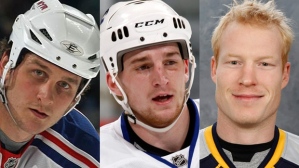 I don’t know why I decided to take on this topic. I’ve spent the better part of a couple weeks thinking about it. Maybe it’s because I’ve been researching mental illness a whole lot or maybe it’s because Theo Fleury’s biography is on my nightstand staring at me, begging to be read one more time. It could be the recent suicide of Slovakian player Miroslav Hlinka. Either way, I think it’s an important piece to look at.
I don’t know why I decided to take on this topic. I’ve spent the better part of a couple weeks thinking about it. Maybe it’s because I’ve been researching mental illness a whole lot or maybe it’s because Theo Fleury’s biography is on my nightstand staring at me, begging to be read one more time. It could be the recent suicide of Slovakian player Miroslav Hlinka. Either way, I think it’s an important piece to look at.
Hockey is a tough sport. It’s one of the toughest sports (arguably the toughest) out there physically. Everyone can see that. Nobody ever thinks of how the sport can affect your brain. I’m not just talking about the fights where getting popped in the head a few times a night can obviously do damage. I’m talking about the hundreds of ups and downs one goes through their career. Not only on them but on their families as well.
Not everything in life is sunshine and rainbows especially in this sport. Don’t get me wrong, there has been progress made. Gone are the days of partying hard with the boys, breaking curfew and showing up to the ice still hammered. Instead we’ve replaced it for the most part with rigorous training schedules, perfect diets, and the always on the go lifestyle.
From the moment we see our kids lace up their skates for the first time, we expect the NHL dream. Some parents more than others jump into that dream with both feet and become an increasingly volatile whirlwind of mental anguish. I’ve seen parents get mad at their kids for not scoring more, not skating fast enough, not playing the body, telling them they’ll never make it and more. It’s bad enough that these kids will get reprimanded from their coaches but to take it from someone who supposedly loves them is hard on the ol’ self esteem.
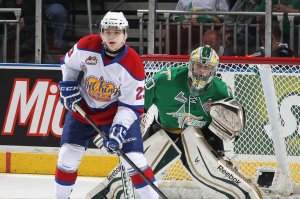
Let’s say your kid shrugs off your words and hey, low and behold he actually has some talent. He gets drafted by a Major Junior team and the offers from NCAA teams in the United States come flooding in. All would be well and good if the stress of not knowing which route to take while dealing with full days of school, possibly a part time job and social life were easy. Don’t forget about the millions of people who will chime in to offer their advice. What do you do? Yes, there are counselors now who are ready, willing and able to help decide which path to take but you know what’s still sitting in the back of little Johnny Hockey’s mind eating at him? The fact that you told him he could never make it.
He’s not going to stand for that though! He’s going to prove you wrong! He decides to take the major junior route and play four solid years while hoping he trains hard enough, eats the right foods and does everything by the book to get onto an NHL team. His dilemma? Well, what happens if he doesn’t and you were right. That thought eats at him every single second of every hour. It starts to interfere with his play, so much so that Johnny Hockey has decided to turn himself into a little enforcer and start fighting in games to get his anger out.
Between games he starts to withdraw and isolate himself. Teammates notice but chalk it up to him just “being Johnny” or over exhaustion. Coaches notice and just shrug it off, telling him to just suck it up and get out there.
So now we’ve got a skillful, angry and depressed enforcer of a player. This wouldn’t be so bad if it were still the 80s/90s. The age of the enforcer is quickly dying in today’s game. Players are being taught more to use their skill and take on more of a role. How does this effect little Johnny Hockey? Well, the first round of the draft was promising when he first started. The rounds are coming and going. He’s finally taken in the last round to….it doesn’t even matter what team, it was the last round.
Of course, getting drafted to the NHL alone no matter what round is a great achievement. However not to our little Johnny. He feels that he’s now a failure and will never see the big time. Starts withdrawing more. Maybe he takes up drinking; maybe cocaine. He moves back to his hometown now that his junior career is over with nothing to fall back on. Spends his days in bed.
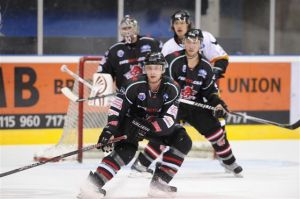
The phone rings. It’s a semi pro team willing to give him a shot. Happy days! Gladly accepting, little Johnny packs up his gear and heads out to his new team.
In middle of nowhere, Europe.
Okay, so it’s not THAT bad. He’s playing hockey for a living!
Yeah, that’s what you think.
The team promised him they were a professional organization. The team also promised him a bi-weekly wage. It’s been a month and he has still to see any of it. The team promised him a fully furnished apartment. It’s a table, stove, fridge and a mattress on the floor; going to have to fill in the rest yourself. His roommate however is another fellow import. At least he’ll have somebody to communicate in his own language with. Good luck with anybody else.
Little Johnny shakes his head but sucks it up. He’s a professional hockey player and damn it, at least he has that going for him.
The team promised him that they would travel by plane. 18 hour train rides later seem to contradict that fact. Well, at least he can rest on his off day. Good luck as the coach has scheduled a practice and oh look at that, you got a game that night.
Frustrated, little Johnny crosschecks the wrong European in the first period of his second professional game. Gloves get dropped and Mr. European catches Johnny with a left hook, sending Johnny to the ground head first knocking him out cold. Concussed, he skates off the ice and gets sent to the team doctor. Doctor thinks he’s alright to play even though he’s slurring his words and seeing double. Coach yells at him to take the next shift because after all they need this win. The coach’s job is on the line.
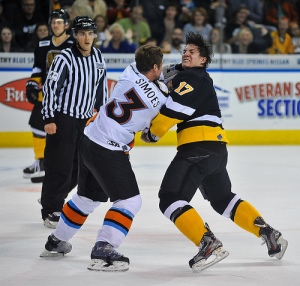 Johnny deals with this year in and year out. Plays everywhere from mainland Europe, to Midwest USA, to the UK, and finally ending in Quebec, Canada. He racks up the penalty minutes on his fight card not really caring about his point total because, what’s the point? It’s not like he’s going to make it back to the show. His wife, fed up with the constant travelling and seeing her husband get beaten to a bloody pulp every night, threatens divorce. Nobody remembers the talent he once possessed. Night in and night out he’s beaten and bruised up all the while thinking, “what am I even doing this for?”
Johnny deals with this year in and year out. Plays everywhere from mainland Europe, to Midwest USA, to the UK, and finally ending in Quebec, Canada. He racks up the penalty minutes on his fight card not really caring about his point total because, what’s the point? It’s not like he’s going to make it back to the show. His wife, fed up with the constant travelling and seeing her husband get beaten to a bloody pulp every night, threatens divorce. Nobody remembers the talent he once possessed. Night in and night out he’s beaten and bruised up all the while thinking, “what am I even doing this for?”
Finally Johnny realizes he’s getting too old for this. He’s only 33 but his body feels like that of a 70 year old. He’s in the locker room one night thinking about hanging them up. He’s caught with sudden anxiety. What is he going to do after this?! He never went to college or never held a job for more than a few months. Hockey is all he knows; where does he turn?
This is where my story ends and my thinking began. Where do the minor, professional, semi-professional hockey players go when the game is gone? Yes, plenty turn to coaching, opening up hockey schools and whatnot but what if you’re not one of the lucky ones to do so? It’s a daunting and scary thought. You’ve lived out of a suitcase for 10-15 years of your life and you’ve most likely not saved very much. Where do you turn?
There’s not many resources there for the players when they leave the game. A lot don’t know what to do with themselves as it’s all they’ve ever known. It’s almost like a soldier in the military getting back to civilian life.
Now what about all of the medical injuries and diagnoses you’ve captured over the years? Most leagues don’t have a pension plan or medical coverage when you’re done with the game. It’s a very important piece to understanding the life of a semi-pro athlete and what they deal with once the glory fades.
If I had the money, I would start up a foundation where players could go to help them with the transition of coming back into the real world so to speak. Just as there are some players who can’t handle not making it (see Terry Trafford), there’s some who can’t deal with never playing again. They need to be caught before something turns ugly.
Mental illness is a big topic in the life of a hockey player. Once things start to slow down and they take a step back to look at their life, that’s when everything comes spiralling out of control. I’ve read it in way too many player biographies. We’re getting better with the NHL’s Hockey Talks campaign but it needs to more than once a year. It’s important to know that it’s okay to ask for help.
I know this article was a long one. I just want people to think of the other story of the coin with our hockey heroes. They’re people just like us and some of them even live pay cheque to pay cheque just like you. They’re not as different as you think.
Feel free to follow me on Twitter: @MarchHockey or like the Facebook page and drop me a line! http://www.facebook.com/marchhockey

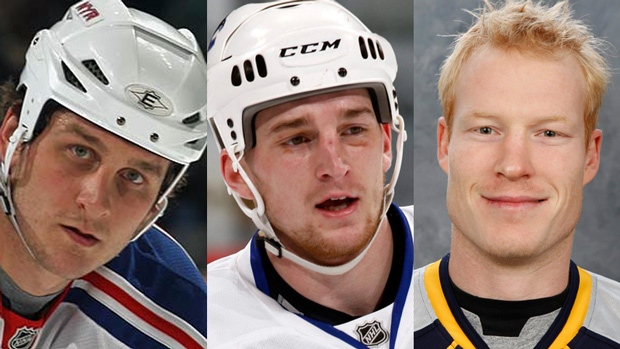
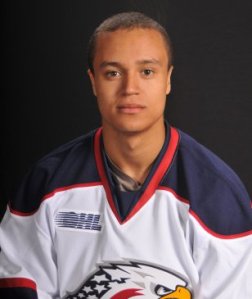
I would love to talk to you about starting a foundation about this problem. As I have lived it 1708 935 3482 cell #
Feel free to add my on facebook if you want Eric, I’m the only Ashley March in Cornwall, Ontario. Or send me an email through my “about March” section! 🙂
This story is exactly everything I have gone through and still struggle with at times. If you need any help I’d love to talk to you about this foundation, or anything I could help be apart of. 949 606 2464
Same here, something really needs to be done!
I have een thinking about this for 2 years now, never had chance to start it but telling people what i would love to do, and this is pretty much word to word what i have been telling, and this is not only hockey players problem but other athletes to… If i can help with ideas or aknoweling problems i would be more than happy to help to, as Im 27 years old player in Europe
Yah me too. Lived it as well.
This is my husbands life. I know it all too well. I’ve seen him struggle post hockey and many other teammates. I’ve watch great players lose focus while signed because they can’t stop worrying about the future and the inevitable… hockey will end and then what. It’s sad.
My ex husband played in the NFL for 8 seasons. The same goes for them. They are not ok after, most not ok b4. It is a sad, sad reality. These guys need help across the board
You’re absolutely right. This does not affect just hockey players; it affects every athlete in the sporting world.
Great article. A lot of what we read rings so true. You have obviously spoken to many players and parents. ( the only thing we could have done without is the “little jonny” reference). We
We have a son who played junior and the minors for 10 yrs. …… The stories are endless. The 3 pictures you show are all young men won’t connections to our city/province. Thankyou for bringing this story forward.
Great article . Come to the dark side ! They have to clean up the junior hockey and hopefully it carries on up the line ! I cannot wait to see the first player put on a full face cage not sure who wore the first grill in football but they are only throwing a ball right maybe a finger in the eye ?
What does it take ? Once the players start weraing grills the need to fight will dissipate and slowly go the way of the dodo bird . If they do slug one another at least the brain and face will be protected!
Fighters are not so much terrified about facing an opponent but more of face planting into the ice or falling backwards and cracking their head open
Denis, you may not recognize the many benifits of wearing a visor but as a current junior player i can tell you there are many. With the sport being such a fast physical game when your head is down you will get blowin up. With a cage your vision is severly hindered, the chin strap causes a player to look down just that much more. Not wearing a cage forces a player gain more stick control and puck placement while shooting. During practice the first time you high stick a teamate you will learn your lesson one way or another. Also when you have teamates standing infront of the net you are going to shoot for high scoring areas on net which are usually low looking for a rebound.
A cage will not stop a player to fight either.You fight to stick up for teamate that gets a cheapshot by a gutless player. Its a brutal sport a cage doesnt take those guys out of the game. Also with cage when take a hit or punch to the cage all of the force goes directly to your jaw ever time. This is worse than taking a stick to the eye.
You cant compare a football facemask to hockey. A football is 10x the size of a puck and can be seen much easier than a small black disc coming at speeds of 90mph
Check out “Warriors on the Ice” by D’ambrosio. Lots of tough guys talking candidly about fighting in the game. 30 former tough guys discuss the mental stress and strain of fighting. Really interesting.
Fantastic piece Ashley. It’s a problem with all sports. I wish there was something at the early stages to ensure the kids coming up get a fulfilling job should their career not take off or be ended early or something like that. It’s tough when a kid just goes ‘all I want to do is play hockey’, how do you keep their minds on studying or developing a trade before it’s all over and they have nothing to show for a 10-15 year hockey career.
Well said. I am a retired Principal and former Junior and college hockey player who has been helping our local Junior A team as their Educational Advisor for over 10 years. Now that I am retired as a Principal I do seminars on Education and Hockey with a big part of what I present being the real life stuff we have to recognize so this cycle you describe doesn’t happen. I am saddened that while many strides have been made in the hockey world, too much has remained the same in too many places. I am trying to change that one step at a time and I appreciate that other people such as this author are as well.
This article is an important one. Thank you for writing it. Hockey’s downside(s) need to be given a higher profile with people, You took the time and made the effort to write about a topic that has been under the public’s radar for too long and putting forth this kind of a balanced perspective is a must for many reasons. I know from my firsthand experience as a family member, with this very thing.Good job!
After 5 years of injury filled junior seasons I played semi pro in the Central Leauge an WPHL for 5 years. I was so down I turned to organized crime. I lost my freedom in 2000 for over 500 days. A few years ago I decided to use my life to inspire others. I just fished a book that will be published this years, a documentary (Return to Happiness the documentary) on YouTube for the world to watch for free. I do some public speaking on motivating and self esteem Ect…feel free to email me and I would love to do an article as I suffer from bi polar and depression due to my bumpy ride as a hockey player. Thank you for this. The sporting world needs this and players need the support.
You can check out my website returntohappiness.com , I wrote a book and film all surrounding this topics, I would love to help in any way. I tries commenting before but I’m not too sure if it went through , film (Return to Happines the documentary) YouTube
Check your messages on your site! Sent you one back!
Congratulation, great article, real good description of the reality of profi and semi profi Sport-People! Regards from Cologne/Germany.
There are numerous studies goin’ on around these two , once wonderful countries , the problem now , seems to be the ” EGO’s ” of the neurologist , and all the other big name medical workers whose title ends in , ” IST ” , there as big , if not bigger than ours’ were when we played , ( this is from a minor league goon who refused to fight in the big time unless i got a chance to SEE , if i could gain the confidence to play at that level .There is some hope , there are a few players attempting to organize a suicide ” HOT – LINE ” , as it stands to reason that it would be us , that knows what we went thru . The bogus attempts made by both these sports to make them safer is beyond laughable . Don Cherry is the ” SPOKES – MAN ” for being the rough tough player that apparently he and his followers’ think . The ” CLOWN ” had 8 , yes ” E I G H T ” fights in is un – illustrious career , there are players i know whom had that many in one month , he apparently played this ” BULLY ” style for over 1300 games , and yes , he had over 2,000 minutes in the penalty box , but remember way , way , way back in his days there was respect for the officials and a ten minute cost for opening your mouth and talking about something you KNOW so little of . Oh how i could go on , but this is long enough .
Great insights!
Wade Belak did NOT commit suicide , he passed away from sexual esfixiation . Please get facts straight before posting an article to the magnitude.
Never once mentioned Wade Belak or how he died in the article. Please read it before making comments.
The picture used is of three hockey players who have suffered from mental illness. Never mentioned anything about their deaths.
Wow. Amazing article. As a billet sister for an OHL team, I’ve seen it happen again, and again, and again, and again. The industry doesn’t set them up for the “what ifs” of not making it; they’re not set up for a life without hockey. It’s very, very sad and you see it unravel every single year. Change is needed.
Wow. Amazing article. As a billet sister for an OHL team for the past 15 plus years, and my parents working at the rink prior to that, I’ve seen it happen again, and again, and again, and again. The industry doesn’t set them up for the “what ifs” of not making it; they’re not set up for a life without hockey. It’s very, very sad and you see it unravel every single year. Change is needed.
Seriously Allison You discust me. Why would you have to say something so trivial when such a serious problem is being brought to light.
wow what a powerful story Ashley and how true,,,I think most teams, coaches and owners have only one thing in mind and that is to win, regardless. You bringing this out will hopefully open some peoples eyes….keep in writing…hugs Doody
I am the daughter of a retired NHL, AHL, OHL, & IHL hockey player. My father is in his mid fifties and has been very vocal about the toll hockey has taken on him mentally & physically. He left home very young to play (14) and I feel as though that affected him the most. He hasn’t played in well over 10 years and still suffers every day from injuries sustained 30+ years ago.
Awesome article, we’ve been through that with our son who is now 24, great player and could have MAYBE gone further, but we could c he was actually trying junior just for us. U could c now he was being treated like a piece of meat, and we told him to come home, so of coarse he did. I wouldn’t wish NHL hockey on any kid. If ur son really wants to go for it, well then go with him all the way. But if things don’t go well , bring him home, that’s what parents r for. To be there!!!
Another comment I forgot march hockey, is I couldn’t believe the fathers at tryouts for junior team, when they said to my husband how they couldn’t believe our son didn’t really want to be there. You could tell, if their son didn’t make the team, it was going to be devastating. This is when my husband really opened his eyes and realize how hard some of these parents r on their kids, and he did not want to be that parent. I think deep down we all wanted it but that totally changed his mind and our son is now becoming a carpenter and much happier. Open ur eyes parents!!!!!!!!!
Really well said Ashley.
As part of a group of guys who grew up with Terry Trafford and were devastated by his loss, the point you bring up about that realization of “it all being over” after hockey really hits home. We raised north of $5000 in a charity game in his memory this past May with proceeds going to Kids Help Phone. I strongly suggest you give them a shout if you do go forward with creating a foundation. The work they do, as well as that of Michael Landsberg (Who came by our event! What a guy), is phenomenal. Both are easily approachable.
Would love to hear what you formulate in the coming months!
The OHA has taken a significant step forward in starting to help players/coaches/staff talk about and reach out for help with mental health issues by making SafeTALK mandatory. Although this is just a starting point, most importantly it starts the conversations.
http://oha.pointstreaksites.com/view/oha/oha-development-programs/oha-helps
Great article and the time for action is long overdue.
Scott Chisholm, Founder of the Collateral Damage Project
http://www.leftbehindbysuicide.org
The dark side of hockey.
Very real article. Heavy hearts today. OHA has moved forward on this as well however , any awareness is always welcomed. I have been in hockey for many years and have seen the positive and the negative. In any sports team moral and well being is in everyone’s best interest. Thank you.
I have also lived it as a spouse of a former NFL player, which is why I have a passion to work with all athletes transitioning from high school, collegiate to pros. I too would love to help in any way that I can. Brandi Winans livespeaker@aol.com.
Excellent article. It’s a very troubling topic indeed. Kudos to you for your research and your opinion, which are both bang on.
Cheers
My son is only 14, and sadly we have seen parents like this since he was about 8 years old. We actually took him to Youngstown, OH to play because we couldn’t stand the parents and the nepotism of the teams anymore in Pittsburgh, PA. My son is very talented, but we want him to be a better person and a better student more than a better hockey player. If he goes far in hockey great. But if he doesn’t, that’s okay too.
Great article. I never played past high school but did join the military. Spent 17 years serving and lost it all due to a medical condition. The athletes are no different. While your playing or serving either your teammates or fellow soldiers are your support group. They are the only ones that know what your experiencing. Once you no longer have that it’s hard to adjust. The military was all I knew. It was my identity. Just like the game is all the players know and it’s their identity. Loosing that is a real tough experience. Of course the government has programs to help our veterans cope with the change. Maybe modeling a program after one similar to what’s available to our vets would be a good place to start. At the end of the day the experiences of the players and our vets are remarkably similar.
In middle of nowhere, Europe?!
“The team promised him that they would travel by plane. 18 hour train rides later seem to contradict that fact.”
“The team promised him a fully furnished apartment. It’s a table, stove, fridge and a mattress on the floor; going to have to fill in the rest yourself.”
Dear, writer!
I think, you have wrong opinion about European hockey….and u still live in 80s or u haven’t be there in last 10 years….
Players from USA lives in, totally furnished apartments, their wages are high and paid on time….and I have never heard or saw when players are traveling by train….maybe, somewhere in the middle of nowhere and in Russia.
Scandinavian, Czech, Latvian hockey clubs mostly are, professional organizations!
It was a story. I never said that all teams were like that and yes it might have been a bit exaggerated to get my point across.
HOWEVER, there’s a lot that goes on, yes even in Europe, that you and the average person don’t know about.
Some European countries with ‘professional’ hockey leagues are exactly as Ashley described. I saw first hand how the imports were treated and warned others not to go to that particular country.
Plenty stories of players getting ripped off, not paid etc… europe and north america alike, and not in the 1980’s.
Jana- you are right to a point, but the writer isn’t completely off either. Most of the guys I know have played in good leagues with good accommodations, but there is still some lower level leagues that are like this (Poland, etc.)
With that, it wasn’t that long ago where there is or was minor teams here in the states that were just as bad.
After 3 years of juniors coping with depression while playing and now after I am done playing, living life is one of the toughest things I have mentally dealt with. I feel like I am behind in every aspect of life compared to everyone my age. I did turn to coaching which led to more headaches and deeper depression. I thank you deeply for this post and If there is anything I can do to help get awareness out there I would love to contribute.
As a Mother of a son who played in the OHL
and who then went on to play in the US with still hopes to making it to the NHL I can relate to a lot of these posts. My son left home at age 14 with many agents offering great things. My husband pushed for this and I will never forgive him for taking him away and the things that were done to him at such a young age.
I want in on this. I know many guys who didn’t even make it to 33 before having to come back home. Let me know if there is any way I could possibly help bring awareness to this terrible topic that is reality to oh so many people.
Motocross has the same problems, for a kid to go pro the parents pretty much need to make the decision for them because the kids are too young to make a career choice. Kids are getting scouted at 8-14 years old and signing their first contracts at 13 or 14. Then if they are lucky enough qualify for nationals they will usually only ride for 7 years average, some getting burned out on the intense phisical training and the stress of the need to succeed and retire at 25 years old. These kids have all had serious injuries and surgeries, common injuries in MX are broken collar bones torn rotator cuffs broken femur ribs fingers ankles neck and spine and head and knee injuries. These kids fade out of the sport and what becomes of a young man/kid who has only known dirt bikes his entire life and has more titanium hardware in him than a modern day sports car? No college degree just good old home schooling in the RV from the time he quit school in 3rd grade to peruse a motocross career, I can’t imagine life is good after that.
I worked for almost 20 years in a Canadian university in the athletics department. Most of the hockey players had been through the Junior system and came to school when they realized that they weren’t going anywhere with hockey. But we had 22 yr olds who hadn’t seriously cracked a book in 7 yrs (why study when you are going to the show, after all. Spend the time on hockey. Besides the travel schedule is not conducive to school). Many of them failed out. Some tried to pursue semi-pro, or hoped to find a factory job. Fortunately some did well with their education and moved on.
You don’t have to have gone through the whole 9 yds like “Johnny Hockey”. We create dysfunctional citizens because of sports long before it gets to that point.
Wow! Well said. This can be put into a movie of an up and coming hockey player who later spirals. And it would be watched by a lot of people. Great article!
You described to a T my ex boyfriend’s hockey career … amazing. He’s now 55 and coaching … and still coping with the broken dream.
I currently work as an NCAA hockey equipment manager but I’ve also worked in minor league hockey in the AHL and now defunct UHL. I’ve seen both sides of this, and your article hits this right on the head. I worked with Derek Boogaard when he was in the AHL. Derek was a tremendous guy and anyone who knew him would tell you he was like a lot of enforcers that are a “big teddy bear” off the ice. It still saddens me to think what happened to him, and I never could of imagined his life ending so soon when I worked with him 10+ years ago.
I’m not going to sit here and bash Major Junior hockey because, it’s obviously excellent hockey and great development for kids moving onto the next level, and being an American I do realize though how Canadians cherish Major Junior hockey. That being said, I also saw a lot of guys who played major junior, worked their butt off to get to the NHL, but come just short of their dream and play the rest of their career out in the AHL, ECHL, CHL, Europe. All of them had the option to go play at a Canadian University to get an education, but many of them don’t, because they don’t want to stray away from their dream of making it. After a while that clock runs out to attend and even play Canadian college/university hockey. I couldn’t tell you haw many of them would express that if they could do it all over again, they would have played tier II, and eventually took advantage of getting an NCAA scholarship, and potentially getting that degree and still getting a shot at the NHL, if not Europe or the minors. After all 1 in 3 NHL players now played NCAA hockey. The guys who are battling it out in the minors with that education know in the back of their minds that if their career ended tomorrow, they would have a job or a career to fall back on. The major junior guys realize their future is somewhat unknown.
Most Canadians I realize have to make a decision of what route to take at a very young age (15/16), so I understand it’s a tough decision to make, when they see all the guys that have made it that route and had a successful pro career. Every route is different for each individual kid, but I guess I’m bias when I think more kids should look at the NCAA route or at least be realistic with themselves and put that pro career on hold and get that paid Canadian degree.